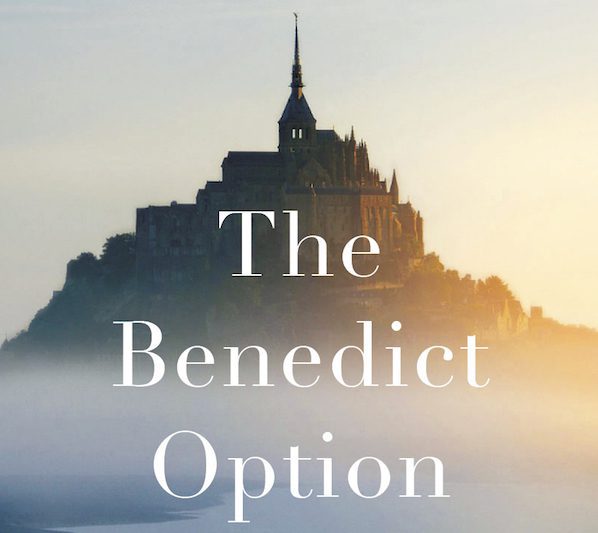No, There’s No New Benedict Option
 Some nice things about Your Scandalized Working Boy in The Economist today:
Some nice things about Your Scandalized Working Boy in The Economist today:
Rod Dreher is one of America’s most influential religious commentators. He has made the case that in today’s godless West, the only viable strategy for traditionally minded followers of Jesus Christ is to make a partial withdrawal from society, and abandon the struggle to assert political power. It is a case he lays out in his book “The Benedict Option: A Strategy for Christians in a Post-Christian Nation”.
The Economist columnist, writing as “Erasmus,” cites a passage from my New York Times column this week:
The crisis is systemic and will not be resolved by new policies and procedures, as the hapless episcopal bureaucrats want to think. Pope Francis is not going to swoop in to save the Catholic Church…If the church is to be rescued, it will have to happen in the everyday lives of the faithful, no longer deceived by illusions or false promises of faithless shepherds.
To which Erasmus adds:
In other words, the church’s newly exposed pathologies provide yet another reason for a kind of pious retreat, into smaller communities where a spirit of self-discipline and self-examination would prevail. And with decent honesty, he acknowledges that the biggest challenge to Christianity’s future may come not from the decadence and hostility of a secular world, but from things that have happened inside its walls. “The greater threat is from internal weakness and vice.”
Many readers, including those who are far from his world of traditional faith, will find more to like in Mr Dreher’s newly contrite tone than they did in his earlier advocacy of withdrawal from a wickedly secular public arena.
… But withdrawal in a spirit of honest repentance is different from withdrawal in a spirit of arrogant disapproval, even though the two things can easily become confused. Now at least, Mr Dreher seems to understand that point clearly—and the abuse scandal has sharpened his understanding.
::::facepalm::::
If you read the book, you will know that I have never believed that the Church (Catholic or otherwise) is a bastion of purity and safety against the wickedness of the outside world. In fact, as I say in the opening pages:
So what if those around us don’t share our morality? We can still retain our faith and teaching within the walls of our churches, we may think, but that’s placing unwarranted confidence in the health of our religious institutions. The changes that have overtaken the West in modern times have revolutionized everything, even the church, which no longer forms souls but caters to selves. As conservative Anglican theologian Ephraim Radner has said, “There is no safe place in the world or in our churches within which to be a Christian. It is a new epoch.”
Don’t be fooled by the large number of churches you see today. Unprecedented numbers of young adult Americans say they have no religious affiliation at all. According to the Pew Research Center, one in three 18-to- 29-year-olds have put religion aside, if they ever picked it up in the first place.2 If the demographic trends continue, our churches will soon be empty.
Even more troubling, many of the churches that do stay open will have been hollowed out by a sneaky kind of secularism to the point where the “Christianity” taught there is devoid of power and life. It has already happened in most of them. In 2005, sociologists Christian Smith and Melinda Lundquist Denton examined the religious and spiritual lives of American teenagers from a wide variety of backgrounds. What they found was that in most cases, teenagers adhered to a mushy pseudoreligion the researchers deemed Moralistic Therapeutic Deism (MTD)
My understanding has not been sharpened. I know nothing in principle different about the Catholic Church today than I did when I wrote the book. The only thing different is the Pennsylvania particulars. That paragraph that Erasmus cites as an example of my new, sharpened understanding is only a summary of the main point of The Benedict Option. I offered it in this context of the Pennsylvania catastrophe in hope that some who had dismissed the book earlier (without having read it) would perhaps take its message more seriously now.
Contra The Economist, the Pennsylvania grand jury report has not “sharpened” my understanding, but vindicated it.

Subscribe for as little as $5/mo to start commenting on Rod’s blog.